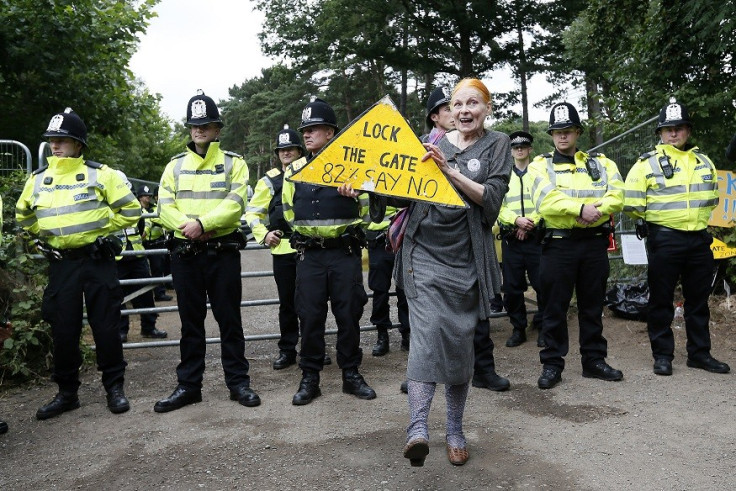Balcombe Anti-Fracking Protest Swells as Church Warns Against 'Blanket Opposition'

Thousands of protesters have descended on the West Sussex village of Balcombe as the row over 'fracking', a controversial method of fossil fuel extraction, intensified.
Fashion designer Dame Vivienne Westwood joined the 200 demonstrators camped near the Cuadrilla drilling site on the first day of a planned five-day protest, which organisers have warned will involve "direct action".
So far, there have been 40 arrests at the site.
"I'm anti-fracking and I'm here to protest. There has been no debate. They are trying to rush this thing through, for what?" Dame Westwood told the Independent.
"I would say most of the country is really against fracking, particularly at this point in time, when we don't know what's at stake," she said.
Pressure group 38 Degrees announced that it had raised £50,000 in four days to fund anti-fracking activism, with unprecedented numbers pledging cash.
Yesterday, Cuadrilla announced that it would stop drilling at the site until confident that its security would not be breached, a process that it believes could take up to a week.
Sussex Police Crime Commissioner Katy Bourne said that the cost so far of policing the demonstration has risen to £750,000.
The Church of England has weighed into the debate, and warned that protesters risked undermining an important new source of cheap energy for those in fuel poverty that was less environmentally damaging than importing from abroad.
"Blanket opposition to further exploration for new sources of fuel fails to take into account those who suffer most when resources are scarce," said Philip Fletcher, the chair of the CofE's group on mission and public affairs.
"Fuel poverty, the creation of jobs, energy self-sufficiency and the development of technology that may reduce the impact of more polluting fuels, are just some of the factors which need to be taken into account in any debate alongside the concern we all have about the impact of fossil fuels upon climate change."
However, Fletcher said that the Church of England retained a neutral stance on the issue: "We do not want cowboys and cavaliers digging up the land in a free-for-all exploitation."
He denied reports earlier this week that the church's commissioners were seeking to use ancient land ownership laws to register mineral rights and cash in on fracking.
The RSPB, meanwhile, warned of the impact fracking could have on British wildlife, and opposed plans for drilling in Balcombe as well as in Singleton, Lancashire.
Harry Huyton from the RSPB said: "Singleton is on the doorstep of an area that is home to thousands of geese and swans, which will arrive from as far away as Siberia to roost and feed next month and stay for the winter.
"There may not be as many local residents as in Sussex, but this area is protected by European law because it is so valuable for wildlife, and Cuadrilla has done nothing to investigate what damage their activities could do to it."
Meanwhile, Cuadrilla's chief executive Francis Egan moved to reassure protesters that fracking would require public consultation and so far their plans only involved drilling for oil on the site.
"Cuadrilla's exploration work at Balcombe involves drilling a conventional oil well. External groups protesting against hydraulic fracturing at Balcombe do so without any work proposal from Cuadrilla to judge," he said
"Any hydraulic fracturing proposal would require a detailed Environmental Impact Assessment, public consultations and multi-agency reviews, all of which would be available for scrutiny."
However, protesters have claimed that the company will start fracking at the site as soon as it has finished drilling.
© Copyright IBTimes 2025. All rights reserved.




















